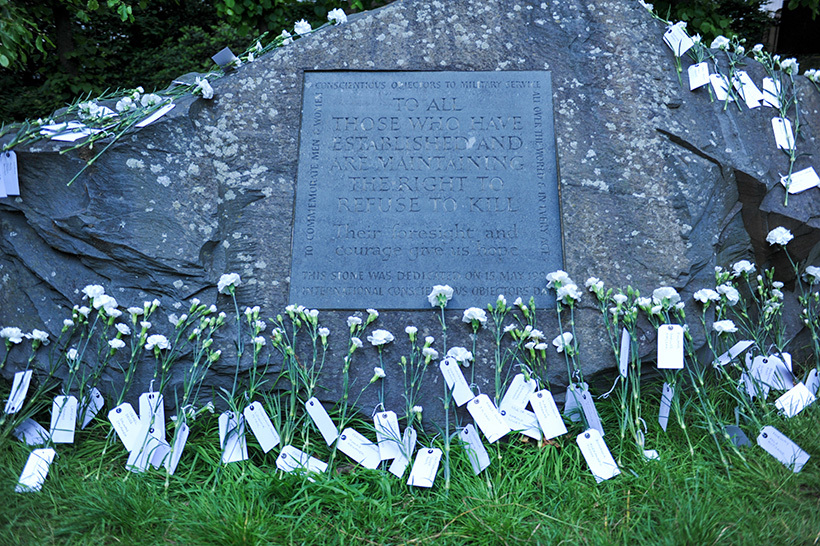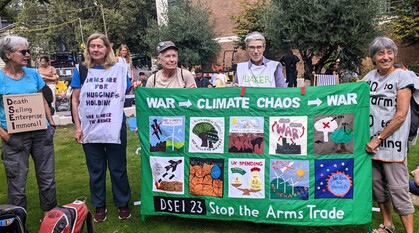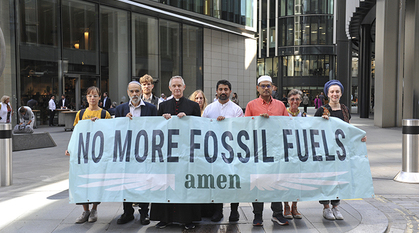"I am dedicated to ending this unjust war"
Suzanne Ismail shares a letter from Sasha, a young Russian man compelled, but unwilling to serve in his country's military.

Sasha's letter was read at this year's International Conscientious Objectors Day reflection, where we give thanks for all who resist the drumbeat of war and instead prefer to walk the path of peace. It can often feel like we are in an endless cycle of violence. Yet the cycle is broken each and every time someone exercises their globally recognised right and refuses to take part in killing.
"On a cold morning of 30 September 2022, I stood in a Moscow metro station, my heart racing as two police officers approached. In that moment, everything I feared became real. Their eyes fixed on me as they asked for my documents. I was to be taken to a police station for 'document verification', but I knew what it meant – my name had been placed on the recruitment list, and the life I once knew was slipping away, caged by the relentless grip of a system I could no longer escape.
"I've always considered myself deeply empathetic. From a young age, I understood the power of kindness and how it could transform not only others but also myself. As a teenager, watching documentaries on WWII deeply affected me. I would sit for hours, thinking about the orphans, widows, and broken families left behind by war. The sheer devastation sparked in me a passion for peace and understanding. I promised myself I would always offer a helping hand to those in need and never hurt anyone intentionally.
"When the Russo-Ukrainian war began, that promise was tested. I knew I couldn't just stand by, so I immediately applied for an international passport, determined to leave the country. By August 2022, with my documents finally ready, I made a rushed attempt to escape. However, due to Covid-19 regulations, I was blocked at the border. At the time, I never even considered the possibility of being mobilised. I naively believed the government wouldn't send its own people to their deaths through lies and propaganda. But just a month later, when the mobilisation started, I realised how wrong I was.
"I was spending time with my friends and family when the news of the mobilisation broke. The sheer shock of it paralysed me. I had no plan and no idea of what to do next. The fear was overwhelming.
"On 30 September, I visited my parents, who were deeply anxious. I had a plan to hide at a friend's summer house in the Moscow region, and I wanted to share it with them. But before I could make it home, I was stopped at the metro station. What followed were hours of terror. I was taken to the mobilisation centre, surrounded by police with no chance of escape. They didn't even allow me to see my parents. Before I knew it, I was on a bus filled with recruits, heading into the unknown.
"Once at the training centre, I refused to accept my situation. I tried to appeal the decision of my mobilisation, hoping to be granted alternative civil service instead. I filed a formal request, but it was ignored – both by government authorities and my military commanders. Despite my efforts, I was deployed.
"Even during deployment, I tried to hold onto my beliefs. I was surrounded by brutality, oppression, and injustice, but I refused to become a part of it. The local population in the area where I was stationed was living under great oppression. I knew I had to do something, so I offered whatever kindness I could. I helped people where possible and treated them with empathy and respect, even when everything around me felt hopelessly dark. Maintaining my humanity was incredibly difficult in such an unjust environment, but being kind to the local population gave me strength and a sense of purpose. It reminded me of the values I hold dear, and it was one of the few ways I could resist the madness around me.
"However, despite these small acts of kindness, the mental strain of being part of something I fundamentally disagreed with was unbearable. I knew I couldn't continue like this. As my scheduled vacation date approached, I made contact with the NGO 'Go by the Forest', who agreed to help me escape. That moment filled me with hope. After months of fear and helplessness, knowing that there were still people willing to help me was a lifeline. With their help, despite the challenges I faced over the 12 months of my forced service, I finally managed to escape Russia.
"Now, I live in Georgia, one of the few places where Russian nationals can seek refuge from their government. Since arriving, I've continued my work to stand up for justice. I have been sharing the truth about the war with the media, giving interviews, and working with a UN committee to help investigate war crimes. This work has given me a sense of purpose in the aftermath of my escape, allowing me to contribute to the fight for peace in a meaningful way.
"The experiences I've endured have reshaped my life and goals. I am now dedicated to ending this unjust war and working toward a future where Russians can live freely and happily, without fear or oppression. I feel a profound empathy for those still trapped in Russia, forced to surrender their moral beliefs just to survive. My hope is for a future where such choices are no longer necessary.
"Your support would be invaluable to me."
Find out how you can take action for conscientious objection


